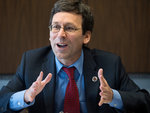






The state Office of the Attorney General has taken the fight against Medicaid fraud to the Capitol, where the state’s top legal adviser is pleading with lawmakers to prevent the expiration of a bill that funds its enforcement.
The Medicaid Fraud False Claims Act, voted into law in 2012, has funded the Medicaid Fraud Control Unit, or MFCU, of the Attorney General’s Office but is due to sunset in 2016. Attorney General Bob Ferguson and his staff are asking lawmakers to ensure that doesn’t happen, setting it as a top legislative priority one year early.
“We don’t want to wait until next year,” Ferguson told The Chronicle in a Tuesday editorial board meeting. “We don’t want to be under the gun in a short session with the sunset facing us.”
In arguments supporting House Bill 1067, which the Attorney General’s Office requested, Ferguson and his staff contend the act has been crucial in stopping several acts of fraud against the Medicaid system throughout Washington. Nearly 15 full-time equivalent positions in the Civil Section of the MFCU have worked to recover more than $5.7 million from fraudulent claiming under the provisions of the act. Ferguson and his staff say if the act sunsets, fighting Medicaid fraud would become more difficult as the only way they could do so would be through criminal prosecutions, which require a higher burden of proof.
Michael Pellicciotti, managing assistant attorney general, stated the 2014 case the state brought against the Centralia School District was one of the first cases the Attorney General’s Office worked on under the provisions of the False Claims Act. The office notified the district of its intent to seek triple damages for alleged violations in which staff claimed reimbursable time through the Medicaid Administrative Claiming program at Centralia Middle School, initially extending an offer for the district to pay $1.65 million to settle the claims.
The district and its legal counsel negotiated that total down to $372,000, as announced in a July public meeting of the Centralia School Board. Pellicciotti said Tuesday the state decided not to pursue triple damages in part because they didn’t see the need from a justice standpoint; however, the state has since sued the consultant who provided the district — and several others throughout Washington — with training on how to claim reimbursable time, JT Educational Consultants, of Wenatchee.
“What the Centralia School District case identified for us was the larger scheme that was taking place,” Pellicciotti said. “It’s not necessarily in our interest now to go after each school district and redistribute the funds in that same way, but it is in our interest to now hold JTEC accountable, which obviously financially benefitted significantly. … We’re talking about a lot of money moving.”
Pellicciotti said it’s up to the Medicaid Fraud Control Unit not only to recover money fraudulently claimed, but also to serve as a deterrent to people who have committed those actions. For the MFCU, it’s about holding people accountable, regardless of intent or method.
“No one statewide wants to be in the same situation people went through here,” Pellicciotti said. “Again, well-intentioned people … I think we realize that people who best serve their communities make sure they’re not committing fraud.”
Litigation is still pending in Thurston County Superior Court against JTEC, but the JTEC case is a major reason the Attorney General’s Office is seeking to have the sunset provision removed from the False Claims Act.
So far, that effort has been successful in two House committees but has not yet been voted on in the Senate; the version that passed both the House Judiciary Committee and the House Appropriations Committee removed the sunset provision from the act itself, but still allows what Ferguson and Pellicciotti both called a critical component — the qui tam whistleblower provision — to die off.
“We feel it’s an integral part of the False Claims Act. It allows us to identify fraud,” Pellicciotti said. “It’s the whistleblowers on the inside who know when the fraud is taking place. The qui tam provision is an integral part of this.”
The qui tam provision has received some blowback primarily from lobbyists from pharmaceutical companies and other industry groups who have expressed some concerns about technical details of that portion of the act.
Ferguson said he’s not happy about the dissent, and he’s paying particular concern to the Senate and whether it will vote the reauthorization through in full. From a funding standpoint, the federal government helps provide a 3-to-1 match in dollars the state spends to enforce the False Claims Act.
“To be candid, it baffles me why there could be any opposition to it,” Ferguson said. “There’s uncertainty in the division (MFCU) on, ‘Am I going to have a job next year?’ I think we have a compelling story to tell now about the progress we’ve been making.”